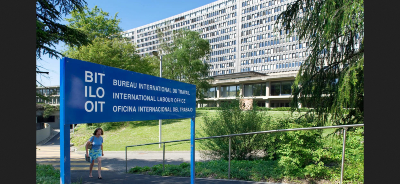Six months ago, news broke that Belgian police had arrested the newly-elected general secretary of the International Trade Union Confederation (ITUC) as part of the “Qatargate” scandal. The government of Qatar was accused of paying bribes to several members of the European Parliament — and to Luca Visentini, the ITUC leaders — in exchange for softening criticism of the Gulf state’s record on labour rights. Visentini’s predecessor, Sharan Burrow, had increasingly expressed support for “reforms” carried out by the Qatari regime, though she was not implicated in the scandal.
In the months that followed, the ITUC removed Visentini from his post and is trying hard to distance itself from the scandal. But the issue of Qatari influence in the labour movement is bigger than the ITUC, as the Guardian reported last week.
According to the newspaper, the International Labour Organization (ILO) “is facing a backlash over the nomination of Qatar to chair its flagship annual conference” which takes place every June in Geneva.
Leading the criticism of the ILO for giving such prominence to the Qatari government is the ITUC itself. According to the Guardian report, the acting ITUC General Secretary Luc Triangle “has written to the UN body to express ‘strong concerns’ about Qatar’s likely presidency of the conference” and warns the ILO of “reputational risk” if it goes ahead with the appointment. The ITUC letter specifically mentions “allegations” that “attempts have been made to influence decision makers in the European Union in a highly inappropriate manner” though without, apparently, naming its own former General Secretary, Visentini.
The ITUC letter is not available on the organisation’s website, but a press release from just two months ago reflects a somewhat different view of the ILO role in Qatar. “The ITUC recognises the ILO’s role in striving to ensure the rights of workers in Qatar, especially migrant workers,” it said.
Under Triangle’s leadership, the ITUC has clearly taken a more critical approach. He told the Guardian that with “this letter we wanted to make clear to the ILO president that we are absolutely unhappy with this proposal because it undermines the credibility of the ILO.”
The ILO seems completely unfazed by the criticism. Just a few days before the publication of the Guardian report, the ILO website announced that an important conference on the subject of “occupational heat stress” had been held — in Qatar. Among those speaking were ILO officials and representatives of the Qatari government. One of those was Ali bin Samikh al-Marri, the Qatari Minister of Labour who has been implicated in the Qatargate scandal.
To be fair to the ILO, discussing heat stress in a country where large numbers of migrant workers died building facilities for the FIFA World Cup might have made sense — except that it is not clear if any workers actually attended the event. The ILO press release mentioned “workers’ representatives” from the Arab states participating, but the only group named was the “National Committee of Labour Committees of Saudi Arabia”. That organisation is not part of the ITUC and a Google search for it produced no results. When I wrote to the ILO press office to enquire which other “worker representatives” participated in the conference, I received no reply.
The decision of the ITUC’s new leadership to distance itself from the previous policy of shameless whitewashing of the Qatari regime is a good beginning. But unions must do much more — and pressure on the ITUC must come from below, meaning from national trade union centres like the TUC in Britain and its affiliated unions.
As for the ILO, its tripartite character means that collusion with authoritarian regimes seems to be baked into the organisation, despite all the good work it does to promote workers’ rights and better conditions for working people.
Unions have successfully put pressure on the ILO to not recognise dictatorial, anti-worker regimes like Belarus and Myanmar. But much more needs to be done — including making sure that the International Labour Conference next month is not chaired by a Qatari minister implicated in the cash-for-influence scandal in Brussels.
This column appears in this week’s issue of Solidarity.
